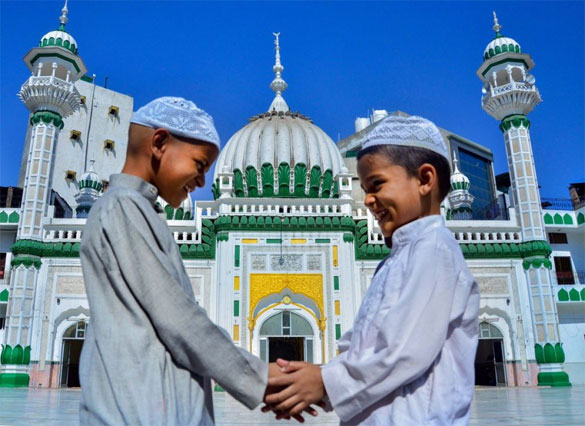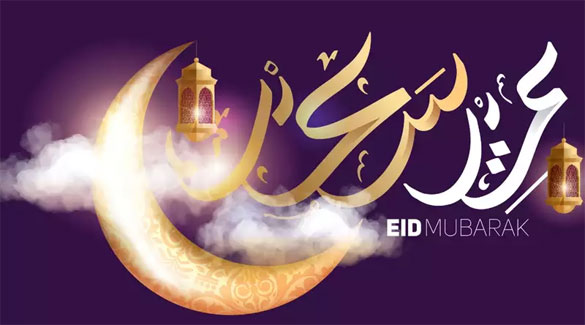
By Ghulam Rasool Dehlvi, New Age Islam
13 July 2021
Consoling The Covid-19 Victims And Their Families In The Safest Possible Ways On Eid That Would Strengthen Communal Fraternity And Brotherhood Which Are Greatly Valued In Islam, And Are Most Importantly Exhorted On Eid-Ul-Fitr
Main Points:
1. They are highly empathetic of those in need, misery and distress by extending our helping hand!
2. Many Muslims in India have decided to shun wearing new clothes on Eid-ul-Fitr and save that money to help the poor, downtrodden and the needy
3. Eid-ul-Fitr is an occasion that comes every year to remind us of our humane duty towards the weaker sections of society.
4. One can certainly celebrate the festivities of Eid ul Fitr while adhering to pandemic precaution rules like social distancing and hygiene maintenance.
----

Eid is an Arabic word meaning: something that returns every year, while Fitr means a form of charity from the rich to the poor. Obviously, the full name of this Islamic festival, Eid-ul-Fitr denotes that its prime concern is ‘charity for the poor’. Thus, Eid-ul-Fitr is an occasion that comes every year to remind us of our humane duty towards the weaker sections of society. It returns every year to enliven the spirit of charity, almsgiving, generosity and sharing with the poor and destitute ones. In fact, the sole purpose of this festival is helping the needy, feeding the poor and assisting the less fortunate ones, and not merely feasting on delicious foods and wearing fancy dresses.
In keeping with this spirit and essence of the Eid, many Muslims in India have decided to shun wearing new clothes on Eid-ul-Fitr and save that money to help the poor, downtrodden and the needy. This year, they are going to observe, rather than celebrate Eid ul Fitr on Friday. On this occasion, they say they have to offer their respect and prayers to those who lost their lives and solidarity and compassion to those who lost their loved ones. Thus, they greatly set an example of being empathetic of those in need, misery and distress in this ravaging pandemic by extending our helping hand!
One can certainly celebrate the festivities of Eid ul Fitr while adhering to pandemic precaution rules like social distancing and hygiene maintenance. Among those prophetic traditions (Sunnats) relating to the Eid-ul-Fitr that we may particularly observe on this Eid are greeting people through online means, comforting the sick people by providing them medicines, plasmas and oxygen as and when required, offering condolences to the bereaved, exchanging gifts with other members of the society, consoling and bringing happiness to the Covid-19 victims and their families in the safest possible ways. Such acts that strengthen fraternity, brotherhood and charity are greatly valued in Islam, and they are most importantly exhorted on the day of Eid-ul-Fitr.
On this occasion, we must not forget that Eid-ul-Fitr actually marks the holy Prophet’s ambition of spreading social cohesiveness, national unity and solidarity with the people. According to a hadith tradition, when the Prophet Muhammad arrived at the city of Madinah, Prophet Muhammad (pbuh) strongly felt the need for a feast that could imbibe peace, unity, charity, brotherhood, equality and deep humane emotions. Having received divine inspiration, the holy Prophet (pbuh) announced: "Almighty Allah has granted two blessed Eids: Eid-ul-Fitr and Eid-ul-Adha ..." (Abu Dawud)
After days and nights of Ramadan are spent in complete devotion to God and sincere goodwill for other fellow human beings, Eid-ul-Fitr comes at the end of this month overflowing with joy, ecstasy and charity for the poor. This is precisely why Islam has enjoined upon Muslims on this day to distribute fitrah (a fixed amount of charity mandatory for every Muslim) to the poor. They are also exhorted to hold delicious feasts and invite friends and neighbours from all faith communities to their tables. Such noble acts on the Eid-ul-Fitr strengthen bonds of love, mutual harmony, human brotherhood, and social integrity among Muslims and other communities. Among the prime objectives of Eid-ul-Fitr is to spread the spirit of peace, delight, kindness, compassion, brotherhood and equality among all peoples, irrespective of caste, creed and religion.

Prophet Muhammad (peace be upon him) greatly stressed on universal brotherhood among all the members of human albeit with their cultural distinctions. Therefore, the Prophet (pbuh), while emphasizing the value of universal brotherhood, used the Arabic word “Ummah” which actually includes all religious communities, races, ethnic tribes and social ranks, each with their own cultural, national, linguistic or temperamental features. The Prophet (pbuh) exhorted his followers to behave towards all of them as brothers and treat them as they want themselves to be treated. He inculcated noble humane values through the festival of Eid-ul-Fitr, with an aim to foster universal human brotherhood.
URL: https://www.newageislam.com/islamic-society/covid-19-celebrate-observe-eid/d/124824
New Age Islam, Islam Online, Islamic Website, African Muslim News, Arab World News, South Asia News, Indian Muslim News, World Muslim News, Women in Islam, Islamic Feminism, Arab Women, Women In Arab, Islamophobia in America, Muslim Women in West, Islam Women and Feminism

No comments:
Post a Comment